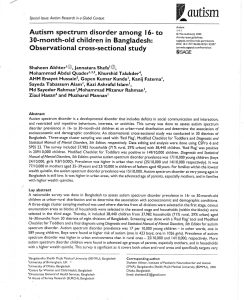
All the members of the team will work in a coordinated way. The Paediatrician / paediatric neurologist will first listen to parents concerns- as they are most likely to detect early abnormalities in their child’s development.
Our Team
Paediatric Neurologists/Developmental Paediatricians, Child psychologists, Autism management teacher, Developmental therapists, Registrar, trainee post-graduate paediatricians, social workers with expertise in ASDs, Nurses trained on Autism Spectrum Disorders (ASD) and their assistants.
Children who attend here
Children referred as having delay in speech or communication, referred by other physicians with suspicion of ASD, displaying any strange behavior or referred from the ‘Child Psychology Clinic’ after having positive ASD screening results or brought by any parents having concerns with their child regarding ASD.
Activities done here
All the members of the team will work in a coordinated way. The Paediatrician/paediatric neurologist will first listen to parents concerns- as they are most likely to detect early abnormalities in their child’s development. After taking developmental and family history, paediatrician will perform a physical examination of the child. Screening tests for ASD like the Modified checklist for Autism in Toddlers (M-CHAT) will be used preferably. If ASD is suspected, then more standardised assessment tools like Autism Diagnostic Observation Schedule (ADOS) will be applied by the Psychologist. A cognitive assessment will performed using BSID and speech and language competency will be assessed by speech and language therapist with ASD training.
Choice of medical tests depends on each child’s clinical condition. These include chromosomal analysis and specific DNA testing for fragile X which is usually not possible here. But investigations like hearing assessment will be done as an important test in all children with delayed speech. Clinical evidence of comorbid medical conditions such as epilepsy would be sought but tests such as EEG will be undertaken only when there is history of seizures. Children with ASD will be referred to speech and language therapy service of the centre.
There is an increased recognition of the overlapping of ASD with other neurodevelopmental conditions such as attention deficit hyperactivity disorder (ADHD) and more specific developmental disorders such as specific language impairment, dyspraxia and dyslexia. So, working with colleagues in Mental Health is crucial, especially for the identification of comorbid mental health disorders like depression, anxiety and obsessive compulsive disorder in these children. Our team will have a joint clinic every fort nightly with the team of department of Psychiatry.
INTERVENTIONS
After the diagnosis, the important part is to inform the child’s family about the intervention plan.
IPNA will have a Day care centre where children will stay in addition to the ‘portage system’ given as out- patient. Children seen as out-patient will be followed up regularly and their needs reassessed, and any additional medical problems such as epilepsy will be managed.
Day care centre for Autistic children
A highly structured, individualized educational strategy in a safe autism friendly environment (AFE) will be followed up here.
A well-structured and supportive environment is one of the most effective ways of helping children with autism to cope with the difficulties they may experience. This includes focusing on putting a routine and some useful support strategies for the person with autism. By ‘autism friendly environment’ (AFE) we mean-
- a safe physical place geared towards mutual exploration
- attentiveness to our child’s needs
- understanding of autistic learning
- unconditional love for the child
- ability to speak literally
- no rules imposed by social convention
AFE will promote and support the development of independence, self esteem and confidence.
The multidiscipline team of this centre will be composed of Autism Management Teacher, Paediatrician, Clinical Psychologist, Therapist, Speech and language therapist, dedicated social workers and Autism specialist Nurses. This centre will offer 1:1 intervention facility for 10-15 autistic children and will use a combine teaching approach of Applied Behaviour Analysis (ABA), TEACCH and PETS.
Individual plan will be prepared for each child depending on the child’s need.
Activities of daily living will be developed here by the developmental therapists
The individual child’s need will be identified in the area of communication through observations, discussions and detailed assessments. Subsequently the Speech and Language Therapist (SALT) will set an individual communication programme and/or system to run g with the child individually and/or through small groups. SALT here will also help in communication of the child using Picture Exchange communication systems, visual cue cards, objects of reference etc. Social skills programmes will also be carried out by the Speech and language therapists. These programmes will address a range of social skills including conversational skills, social etiquette and social understanding.
All the children will be assessed in detail before, at and after admission, including extensive investigation of their social, emotional and behavioural needs. Team will be trained in aspects of managing challenging behaviour. Behaviours, both appropriate and inappropriate will be managed on an individual basis by behavioral therapy. The children will be encouraged and rewarded for appropriate behaviour
and discouraged from using inappropriate behaviour.
The individual targets will be reviewed on a regular basis and new targets and strategies will be developed as needed.




 IPNA wants to create a world where children with developmental disabilities and their parents can get their questions answered and their needs met in a caring environment.
IPNA wants to create a world where children with developmental disabilities and their parents can get their questions answered and their needs met in a caring environment.